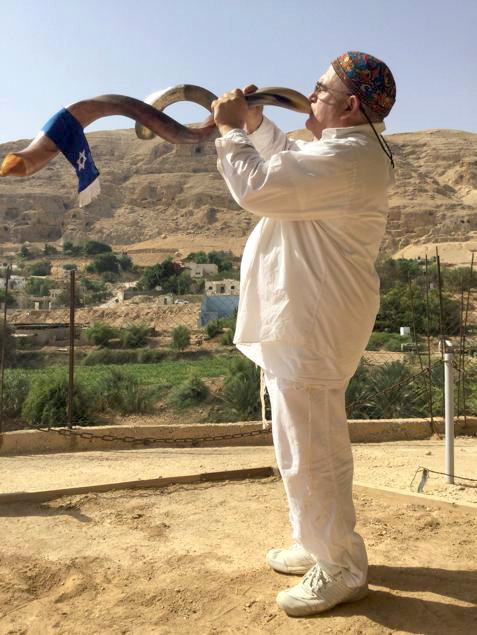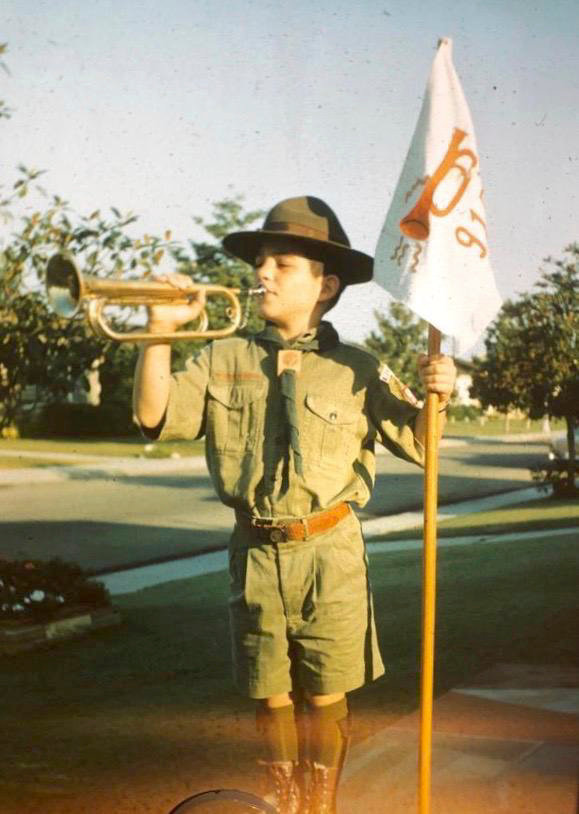In Judean Desert, Weinger’s shofar love song
As first-chair trumpet in the Orville Wright Junior High School band in Los Angeles in 1966, Robbie Weinger didn’t know it, but he was training his lips for their destiny.
As Jews the world over are looking for someone to blow shofar for them, Weinger will be in Jerusalem, part of a team of shofar-sounders dividing up the city by neighborhood so that citizens can fulfill the commandment to hear the shofar blown on Rosh Hashanah.
As a child, Weinger was not only a trumpeter but also a self-described “Hebrew-school rebel” who grew up to be a business executive and “a secular Jew to the core.” But now he’s known in Israel and beyond as “shofar man,” one of the world’s master blowers, a baal tekiah who’s running a shofar center in the middle of the Judean Desert.
The ram’s horn was first referenced in the Torah when Hashem used it some 3,700 years ago to call the Israelites together to hear the Ten Commandments at the foot of Mount Sinai.
Throughout his journey, Weinger recounts, he was inspired by his father, Jack Weinger, who was born just before Rosh Hashanah in 1917 and died exactly 100 years later on Rosh Hashanah 2017. His painting, “The Great Shofar,” is now the insignia of the shop his son runs 7,567 miles from his California birthplace.
Robert Weinger, in the shofar business full-time by 2008, had made aliyah by 2017.
Weinger established Shofar So Great in Beit Hogla, a tiny sand-blown speck on the map in the shadow of the ancient town of Jericho. It was here that the Israelites entered the land — and the priests blew the shofars and the people shouted, collapsing the city’s walls.
The shop is stocked with hundreds of shofars in every size and shape, fashioned from the horns of kudu, gemsbok, goat, and, of course, the traditional ram, many of them illustrated by Israeli artists. Weinger share with visitors the history of the shofar and runs workshops on the fine art of shofar blowing.
“Robert also tells the story of his spiritual search and how it landed him in this small eclectic community — what he’s doing here is attracting people to this somewhat hidden part of Israel,” says tour guide Shalom Pollack. “The people here are pioneers taking a dusty piece of land and making the desert bloom like our ancestors did thousands of years ago.”
Because of the pandemic, most of Weinger’s sales are conducted online these days. He also reports a decided uptick since the Jewish world woke up to the fact that opportunities to hear shofar in synagogues will be limited, and they might need to blow shofar themselves for their family, friends and neighbors this year.
On the Jewish New Year, Jews not only pray to be inscribed in the proverbial “Book of Life” for a happy and (this year in particular) healthy new year, but also again coronate G-d as king and resolve to make a fresh start in the new year.
And the shofar is an integral part of all that.
As the sound pierces the listener to the core, it’s a cry of repentance on the day of judgment, hearkening back to the shofar used to call the Israelites to battle. Or, as Rabbi Yehuda Lave of Jerusalem puts it, “It’s also no coincidence that it’s on Rosh Hashanah that we read about the near-sacrifice of Isaac and the ram that was sacrificed in his place.”
“Hearing [the shofar] awakens the power of Jewish history in every heart,” says Weinger. “It’s as if G-d speaks through it directly to His people and everyone who hears this sound — young and old, observant and secular — has an intense spiritual experience, of crying to G-d for mercy as opposed to judgment.”
“I’ve never heard anyone blow the shofar like Robert,” says Rabbi Hagi Ben Artzi who teaches at Bar-Ilan University in Ramat Gan, as well as a woman’s seminary in Beit Hogla, where he first heard Weinger blow. “You can feel his shofar expressing something very deep, as if the sound comes from the bottom of his heart and spirit.”
“That’s why he’s living so close to Jericho, where the miraculous collapse of these walls occurred through the voice of the shofar,” adds Rabbi Ben Artzi, who has the distinction of being Sara Netanyahu’s brother. “Seeing the prophecy of G-d gathering His people back to their homeland being fulfilled, every time Robert blows, he’s saying, ‘Listen, God is here’.”
Smack dab in the season of COVID-19, Rosh Hashanah, the holiday rivaled only by Passover on the family-friendly scale, is expected to find families restricted from gathering. And since, along with Yom Kippur 10 days later, it is historically the No. 1 attendance magnet for synagogues, congregations everywhere are struggling to balance religious traditions and Torah-based mitzvot with government-mandated safety regulations.
Meaning that on Rosh Hashanah, limited seating is likely to pass many shofar honors to smaller neighborhood minyans.
“Every neighborhood needs a shofar and someone who can blow the notes,” Weinger says.

 47.0°,
Mostly Cloudy
47.0°,
Mostly Cloudy 







